
Key Takeaways:
The Ultimate Guide: Unleashing the Power of Your Gaming PC
As an enthusiastic gamer, you know that having a high-performance gaming PC can significantly enhance your gaming experience. The smoother frame rates, better graphics, and quicker load times can take your gameplay to the next level. However, simply owning a powerful gaming PC doesn’t automatically guarantee the best performance. To truly unleash the power of your gaming PC, you need to optimize its components, settings, and software. In this comprehensive guide, we will walk you through the essential steps to maximize your gaming PC’s performance and elevate your gaming experience. So, let’s dive in and unlock the true potential of your gaming rig!
Section 1: Understanding the Fundamentals
Before we explore the optimization techniques, it’s crucial to understand the underlying components that give your gaming PC its power. A basic knowledge of these fundamental elements will provide you with an informed foundation for leveraging their potential.
The Processor (CPU)
The central processing unit (CPU) acts as the brain of your gaming PC. It handles all the calculations and processes necessary to run games efficiently. To ensure optimal performance, it’s essential to invest in a powerful CPU that suits your gaming needs. Manufacturers like Intel and AMD offer a range of high-performance processors designed specifically for gaming purposes. Look for CPUs with higher clock speeds, multiple cores, and ample cache size to experience smoother gameplay and reduced lag.
The Graphics Card (GPU)
The graphics card, or GPU, is responsible for rendering and displaying the stunning visuals in modern games. To make the most of your gaming experience, you’ll want a graphics card that can handle the demanding graphics-intensive tasks. Brands such as NVIDIA and AMD manufacture GPUs specifically designed for gaming. High-end graphics cards offer features like ray tracing, higher frame rates, and increased VRAM, resulting in detailed graphics and more immersive gameplay.
Memory (RAM)
Random Access Memory, or RAM, plays a crucial role in storing and accessing data quickly. A higher amount of RAM allows your gaming PC to handle multiple tasks simultaneously, preventing slowdowns and enhancing the overall gaming experience. For gaming purposes, aim for at least 8GB to 16GB of RAM. However, for more demanding games and multitasking, higher capacities, such as 32GB or even 64GB of RAM, may be necessary.
Section 2: Implementing Optimization Techniques
1. Update Your Drivers Regularly
Graphics card drivers and other system drivers play a vital role in unlocking the full potential of your gaming PC. Manufacturers release frequent driver updates to improve compatibility, fix bugs, and optimize performance for the latest games. To ensure your system is running at its best, regularly check for driver updates from the manufacturer’s website or use dedicated driver updater software to automate the process.
2. Optimize In-Game Settings
Most modern games offer a wide array of settings that allow you to customize the visuals and performance according to your preferences. While it may be tempting to set everything to the highest possible level, it’s wise to strike a balance between graphical fidelity and performance. Experiment with different settings to find the optimal combination that offers visually stunning gameplay without sacrificing smoothness or responsiveness.
3. Keep Your Software and Operating System Updated
Regularly updating your gaming software, such as game launchers and platforms like Steam or Epic Games Store, is essential for improved performance and compatibility. Additionally, keeping your operating system up to date ensures you have access to the latest system optimizations, bug fixes, and security enhancements. Set your system to automatically install updates, or periodically check for updates manually to ensure you are always up to date.
4. Pay Attention to Thermal Management
Intensive gaming sessions can cause your gaming PC to generate substantial heat, potentially leading to thermal throttling and decreased performance. Proper thermal management is crucial to ensure your gaming PC operates within optimal temperature ranges. Make sure your PC has adequate airflow with strategically placed cooling fans. Regularly clean dust and debris from your PC and consider using additional cooling solutions, such as liquid cooling, to prevent overheating and maintain peak performance.
5. Manage Background Processes
Background processes and applications consume system resources, detracting from your gaming PC’s performance. It’s important to close unnecessary programs and disable unnecessary startup processes to free up valuable system resources. Use the Task Manager or third-party software to identify resource-intensive processes and terminate or disable them while gaming. By managing background processes, you can ensure your gaming PC dedicates its full power to delivering an exceptional gaming experience.
Section 3: Frequently Asked Questions
Q: How can I know if my gaming PC needs an upgrade?
Q: Can I optimize my gaming PC’s performance without spending money?
Q: How often should I clean my gaming PC?
Conclusion
Optimizing your gaming PC is a surefire way to unlock its full potential and elevate your gaming experience. By familiarizing yourself with the essential components, implementing optimization techniques, and keeping your system up to date, you can ensure smoother gameplay, reduced lag, and visually stunning graphics. Remember to regularly check for driver updates, optimize in-game settings, and pay attention to thermal management to maintain peak performance. With these steps, you’re well on your way to unleashing the power of your gaming PC and immersing yourself in unforgettable gaming adventures.
Source: insidertechno.com